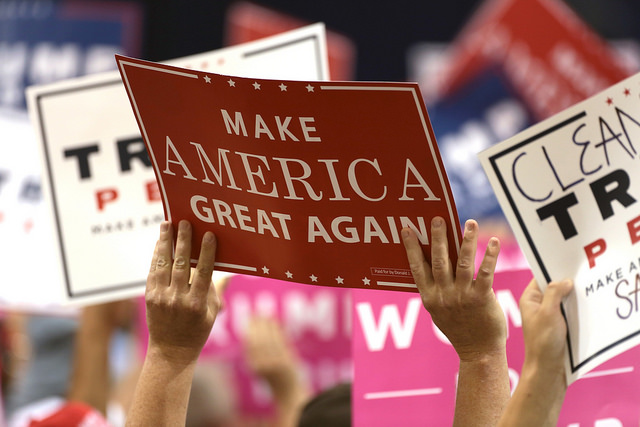
Post Tuesday’s meeting with the President of the United States, Donald Trump, drug makers in the US are likely to heave a sigh of relief. Yet, the key takeaways from the meeting will have huge ramifications for the global pharmaceutical industry, whose supply chain has various forward and backward linkages spanning several countries spread across continents.
The meeting was attended by the top names in America’s pharma industry, including Stephen Ubl, CEO of Pharmaceutical Research and Manufacturers of America (PhRMA), Ken Frazier, CEO of Merck & Co., Dave Ricks, CEO of Eli Lilly & Co and Bob Hugin, Chairman of Celgene Corp among others. The pharma honchos welcomed Trump’s calls for lower taxes and fewer regulations.
Though there’s still ambiguity on the matter of drug prices, Trump appeared to back off from the worst-case scenario for pharma companies — that the US government will be setting drug prices. He also didn’t speak on Medicare being given the power to negotiate drug prices.
This week, PharmaCompass brings you key takeaways from Trump’s speech:
“Medicare,
Medicaid, we have to get the prices way down”
Trump has advocated bringing down drug prices. Speaking on the issue, Trump said the “pricing has been astronomical.”
After hearing Trump’s criticism of the pharma industry earlier this month (in a press meet held on January 11), which had sent the drug and biotech stocks plunging, many of the CEOs of the world’s biggest pharma companies had come to Washington with possibly the worst fears in mind. Addressing them in the Oval Office, Trump began on a rather positive note, when he said: “You folks have done a very great job over the years, but we have to get the prices down.”
“We have to get prices down for a lot of reasons. We have no choice. Medicare, Medicaid we have to get the prices way down so that’s what we’re going to talk about.”
In the past, Trump has said the US government will negotiate prices directly with the industry on behalf of Medicare and Medicaid, which are amongst the world’s biggest purchasers of healthcare products and services and cover tens of millions of Americans.
However, this week, he did not speak of the government setting drug prices. Instead, he said, “competition is key to lowering drug prices.”
“We've been focused on accelerating
FDA”
Giving the example of terminally ill patients, who can’t avail of a new drug that is undergoing clinical trials and is yet to be approved by the US Food and Drug Administration (FDA), Trump said he wants to accelerate the approval process of drugs by the FDA.
“We need to streamline the process, so that, from your standpoint, when you have a drug, you can actually get it approved if it works, instead of waiting for many, many years.”
“New drugs have led to longer, healthier lives, we all know that, but we have to do better accelerating cures, we've been focused on accelerating FDA. We'll get the approval process much faster,” Trump said.
“We’re going to be ending global freeloading”
On Tuesday, Trump blasted foreign countries, which he said have been “freeloading” on the United States with price controls that limit what their own citizens can be charged for medications.
He stuck his neck out for ending global freeloading.
“We’re going to be ending global freeloading. Foreign price controls reduce the resources of American drug companies to finance drug and R&D innovation. I think you people know that very well. Very unfair to this country.”
Alongside, he vowed to change America’s trade policy, so that other countries pay for drugs that are manufactured in the US.
“Our trade policy will prioritize that foreign countries pay their fair share for US-manufactured drugs so our drug companies have greater financial resources to accelerate the development of new cures. And I think it’s so important. But right now, it's very unfair what other countries are doing to us.”
“Every other country lives on devaluation”
According to Trump, currency devaluation by other countries had increased outsourcing of production by drug makers. He blamed the previous governments for running America badly, by not understanding devaluation and urged American drug makers to make more of their products in the United States.
“A lot of the companies have moved out. They don’t make the drugs in our country anymore. A lot of that has to do with regulation. A lot of it has to do with the fact that other countries take advantage of us with their money and their money supply and devaluation because we don't know anything — our country has been run so badly, we know nothing about devaluation. Every other country lives on devaluation,” Trump said.
Our view
With his January 11 press meet, Trump had sent shockwaves in the pharmaceutical industry by saying “pharma has a lot of lobbyists” and a lot of power and there is very little bidding.
“We’re the largest buyer of drugs in the world. And yet we don’t bid properly. We’re going to start bidding,” Trump had said, adding that he hopes to save billions of dollars through the process of bidding. As of today, the federal law prohibits Medicare to negotiate drug prices.
At the Oval Office meet on Tuesday, Trump did not speak on bidding. He also did not speak on the US government setting drug prices, thereby allaying some of the worst fears of drug-makers.
The US is, after all, the world’s largest market for pharmaceuticals, with pharmaceutical sales of around US $ 333.7 billion in 2015, and heavy R&D spends. Any change in the US drug market or the country’s policies is bound to have ripple effects across the global drug industry.
While the pharma CEOs must be breathing easier after Tuesday’s meeting, Trump’s presidency is definitely going to shake up the global pharmaceutical industry’s ‘business as usual’ scenario.
Watch this space for more!
The PharmaCompass Newsletter – Sign Up, Stay Ahead
Feedback, help us to improve. Click here
Image Credit : Donald Trump sign by Gage Skidmore is licensed under CC BY 2.0
“ The article is based on the information available in public and which the author believes to be true. The author is not disseminating any information, which the author believes or knows, is confidential or in conflict with the privacy of any person. The views expressed or information supplied through this article is mere opinion and observation of the author. The author does not intend to defame, insult or, cause loss or damage to anyone, in any manner, through this article.”







